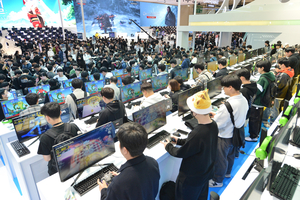Seongnam city’s AI contest reignites controversy over whether gaming is addictive

Korea stands tall as a global gaming powerhouse, fueled by cutting-edge tech, the widespread usage of personal computers and a passionate gaming community.
Its thriving industry not only dominates at home but sends Korean games around the world, making the country the fourth-biggest game exporter in the world and driving 70 percent of Korea’s total media content exports.
Despite the success, the industry still battles a deep-rooted stigma linking games to harmful addiction.
The latest controversy was sparked by a recent artificial intelligence contest organized by Seongnam, a city in southern Gyeonggi province and home to Korea’s IT and gaming hub, Pangyo Techno Valley.
Earlier this month, Seongnam and its addiction support center began accepting submissions of AI-generated short videos and songs about preventing various addictions. The issue arose from the organizers naming four addictions: alcohol, drugs, gambling and “internet gaming.”
The gaming community reacted immediately, with 13 associations representing gamers, the esports and gaming industry, and gaming scholars castigating the labeling of gaming as an addiction.
Seongnam city explained that it simply followed the 2025 mental health business guidelines from the Ministry of Health and Welfare, which names gaming as an addiction, and removed the word “gaming” from the phrase “Internet gaming.”
The gaming community followed up by filing a formal inquiry with the Ministry of Health and Welfare to demand answers about the extent of its involvement, if any, in the AI contest and whether it considers gaming an addiction.
Strangely, the 2023 mental health business guidelines published by the same Ministry of Health and Welfare just two years ago had zero mentions of gaming in the entire document.
The clarification by the city of Seongnam appears to be an attempt to avoid blame as it is home to Pangyo Techno Valley, where a majority of Korea’s leading game developers have been headquartered for years — including NCSoft, Nexon, Kakao Games, Smilegate and Wemade.
The Ministry of Culture, Sports and Tourism, which oversees the gaming sector, later sent out an official notice to the Health Ministry and local governments, pointing out that the debate over whether gaming causes addiction is still ongoing among scholars around the world. It noted that there is a lack of scientific evidence, and asked them to refrain from using the word “addiction” to describe gaming or listing gaming among addictive behaviors.
“In the Culture and Arts Promotion Act, which was revised in 2022, gaming was included in the sector of ‘culture and arts,’ and a 2024 survey by Gallup Korea showed that gaming was the hobby with the greatest appeal to Koreans, so the social perception (of gaming) is changing,” said Lee Cheol-woo, a lawyer who heads the Korean Game User Association.
“Policies that regard gaming as a subject for addiction control run counter to this social change.”
President Lee Jae Myung, in his election campaign, vowed to support the gaming industry, signaling positive changes toward the country’s gaming sector. If Korea wants to take the next step to lead the gaming world, policymakers must recognize that the enemy is not gaming itself, but ignorance.
By Kan Hyeong-woo (hwkan@heraldcorp.com)
